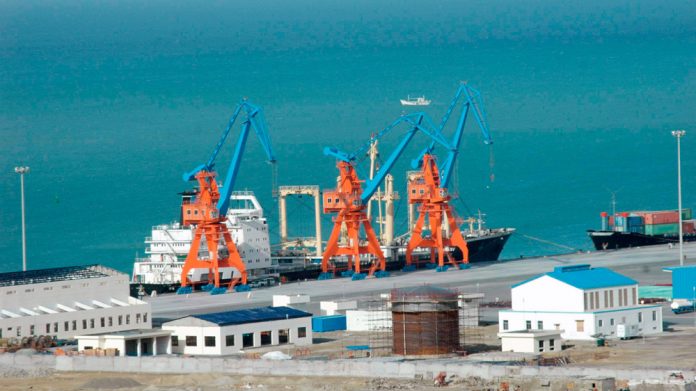The only deepwater South Asian Pakistan Terminal (SAPT) in Karachi, being constructed by Hutchison Ports Holding (HPH) with Karachi Port Trust (KPT), would be operational by mid-March this year as 16-meter dredging in the sea is almost going to complete in next few days, said Hutchison Port CEO Capt Syed Rashid Jamil.
This time, the KPT has chosen right contractor Van Oord, a Belgian company, for the dredging in deep water and it has done a very satisfactory job so far,” Rashid informed Pakistan Today in an exclusive meeting.
The SAPT port has been developed at the Karachi’s entrance with a huge space to anchor mother containers ships, which was not possible earlier. However, Pakistani government with China is also developing Gwadar as a deep water port (Free Port) but it would be fully operational by 2025-30 after completion of China Pakistan Economic Corridor (CPEC) and its related economic zones in Gwadar and other parts.
“We expect that by the mid or end of this month, we will have enough depth to open our channels for large vessels to access it,” he claimed. So far we are satisfied with the ongoing work and the speed at which it is being done. As per the agreement, 6-metre sea-depth is required but we can increase up to 18 or 20 meters in the future if required, he further explained.
Rashid says that Prime Minister Nawaz Sharif will probably inaugurate this port by mid March this year which will open new gateways for international businesses as mother ships will be having a container capacity of 18,000-20,000 TEUs.
The SAPT was built by Hutchison Ports Holding with an investment of over $600 million while the government, through KPT, has spent money on its infrastructures like waves-breakers, dredging in deep water, roads and bridges etc. Major containers ships could be handled in Karachi through this port.
After inaugural of the SAPT, the logistic cost will reduce with quick services and infrastructures,” CEO Rashid said adding that this will further maximise cost of doing business in Pakistan as we have equipped the terminal with a state-of-the-art technology, which includes automated gates with identity cards checking system, RTGCs with position determination systems, remote controlled cranes (operated with CROS), control tower coordination, CCTV and trunk radio systems, mobile terminal messaging system, etc. Furthermore, in order to facilitate operations, leading technology has been installed for navigation, berthing, loading/unloading, yard and storage, customs inspection and all other functions, the CEO informed.
On December 19, 2016, the company has initiated its test operations at ‘One A port’, while One B, One C and One D ports are still under construction. Our another port ‘One B’ would be operational by April this year, the company official said adding that so far we had handled more than 35000 TEUs and we cleared big ships in a very short time. Our test operations are free of cost and we are not charging for it, he claimed.
The SAPT is the only private container terminal that has been designed and built as a specialized container terminal. The three other container terminals, presently existing, have been created on berth and yard areas, originally meant for bulk cargo, Rashid said.
In addition to this, the terminal will be the first to introduce online payment system for customers, thus eliminating most of the tedious paperwork to have a shipment processed and cleared.
What also makes the SAPT so different is that it is backed by the HPH, the world’s leading port investor, developer and operator, operating 319 berths at 52 ports in 26 countries. The management in Hong Kong is directly overlooking all aspects of the port, bringing in the huge expertise and experience of port management from across the globe.
He said the company had so far handled 82.9 million TEU till 2014, playing a significant role in the development of economies and the expansion of international trade of the countries. We also invest big in skill development and training of our employees for their professional learning and growth.
The CEO further said that our constant efforts to ensure the level of standard and quality across all the countries keep growing consistently.




